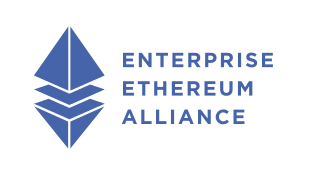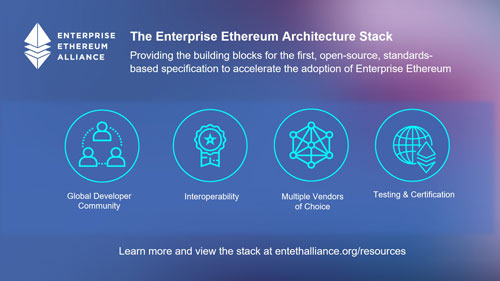Enterprise Ethereum Alliance Advances Web 3.0 Era with Public Release of the Enterprise Ethereum Architecture Stack
May 2, 2018
Building Blocks for the EEA Specification Focus on Speeding Up Business Transactions, Building Greater Trust in Deals, and Developing More Efficient Business Models
NEW YORK, N.Y. – May 2, 2018 – The Enterprise Ethereum Alliance (EEA), with over 500 members, today unveiled the next phase of its Enterprise Ethereum specification strategy, with the public release of its Enterprise Ethereum Architecture Stack. This stack defines the building blocks needed to drive the Web 3.0 era of decentralized, connective intelligence – the next generation of Enterprise Ethereum applications that, like the Internet, will work anywhere, and are capable of facilitating smart contracts without intermediaries. The stack, available as a free public document to download, incorporates components developed by the Ethereum Foundation.
- Download the Enterprise Ethereum Architecture Stack document
- Listen to a walkthrough of the Enterprise Ethereum Architecture Stack
- Learn more about the EEA at Blockchain Week New York City
“With the public release of the stack, the EEA is on its way to delivering a world-class standards-based specification for Enterprise Ethereum solutions with a TestNet and certification program to follow,” said the EEA Executive Director Ron Resnick. “The EEA’s standards-based approach enables enterprises to deliver a superior customer experience and create new, and innovative solutions. Plus, having multiple vendors of choice will likely mean competition will drive down costs.”
Until recently, developing an enterprise blockchain solution required organizations to build from the ground up either using their own enterprise-friendly implementation of Ethereum or other variations of a private-permissioned, Enterprise Ethereum application. The EEA’s architecture stack tackles these issues. In the near future, Ethereum developers will use the specification to write code that will enable interoperability, motivating enterprise customers to select EEA specification-based solutions over proprietary offerings.
EEA Momentum
The EEA’s stack was developed by its members, which include both technology leaders and potential users of the specification. Over the past 18 months, 500 organizations have joined the EEA, driving the creation of close to 20 member-led EEA User and Technical Working Groups to define market requirements and write the EEA specification, respectively.
About the EEA
The EEA is a member-led industry organization based on the goal of empowering the use of Ethereum blockchain technology as an open standard for the betterment of all industries, focused on the needs of enterprises. For additional information about joining the EEA, please reach out to [email protected].
Supporting Board Member Quotes
Santander Bank
“The Alliance’s mission from day one has been to build the framework that could be used to meet all the needs of its members. The public release of the Enterprise Ethereum Architecture Stack enables enterprise members to collaborate and collectively contribute to, and benefit from, the global Ethereum effort and the EEA’s forthcoming specification,” said Julio Faura, chairman of the EEA, and founding EEA member from Santander Bank, and head of R&D for Innovation Initiatives at Santander Bank.
ConsenSys
“The EEA is rebuilding business infrastructure from the bottom up. By solving the universal collaboration needs of its members, the Enterprise Ethereum Architecture Stack can now serve as a critical framework element of the world’s decentralized operating system – an EEA specification that will facilitate more valuable interactions, more efficiently, between the enterprise and its customers. I look forward to seeing how sectors and industries build shared collaborative infrastructure on the EEA stack, and how such networks forge interoperation amongst one another and how each begins to use public Ethereum as part of their comprehensive, blockchain-based IT infrastructures,” said Joseph Lubin, a founding EEA member from ConsenSys, co-founder of Ethereum, and founder of ConsenSys.
Accenture
“Defining the Enterprise Ethereum Architecture Stack is an essential step for creating a standards-based, enterprise-ready approach. Ethereum is already one of the broadest developer user bases across industries. The architecture and coming specification will make Ethereum applicable for enterprises and corporations. We are very pleased to be part of this important initiative and look forward to working with everyone involved,” said David Treat, a founding EEA member from Accenture, and managing director and global blockchain lead at Accenture.


